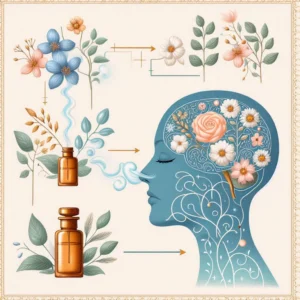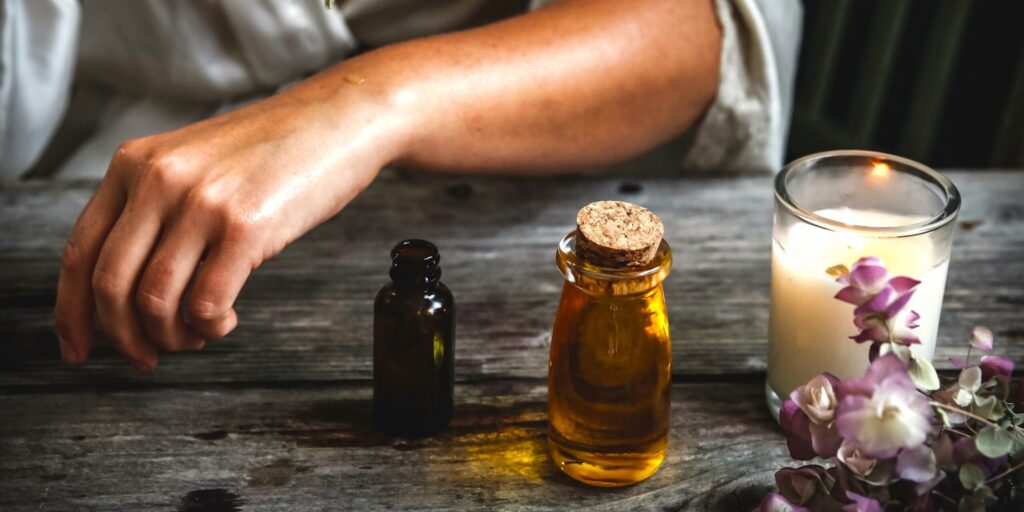Read time 5 minutes
Gratitude. If I could choose one word to describe my outlook today, it’s that.
Despite the unraveling diagnosis, the unpredictable symptoms, and the years of physical struggle, I’m still here, breathing, healing, and learning. And for that, I thank the Universe with all my heart.

Every fragrance has a story. Mine came with lessons, strength, and the courage to live without compromise.
It started as an innocent love for perfume.
A splash of scent that felt like an extension of myself unfolded into a realization. It was far bigger than I could have imagined. I never thought something so subtle could have such a profound impact on my neurological health.
This blog is not just about my rare condition. It’s a heartfelt exploration into how seemingly harmless choices, like our daily fragrances, can intersect with chronic illness in ways we rarely talk about.
If you’re dealing with neurological issues or autoimmune disorders, I hope my story brings insight and comfort.
Life with Isaacs’ Syndrome: A Rare Neurological Reality
In 2016, my world changed forever. I was diagnosed with Isaacs’ Syndrome, a rare autoimmune neuromuscular condition. It causes continuous muscle fiber activity, leading to stiffness, twitching, and persistent cramps. Initially, I couldn’t comprehend what was happening.
I would lie in bed, trying to sleep, and suddenly my body would start twitching. Little ‘tic tic’ sensations, sometimes every 30 seconds, sometimes longer, and it went on for hours. The rippling under my skin felt like something alien, muscle spasms across my calves, biceps, and even my face.
Every movement felt involuntary and relentless. Sleep became a luxury. Walking became an ordeal. Climbing stairs felt like an uphill battle. And amidst all this, my emotional health faltered. How does one cope when the body becomes its battlefield?
But Isaacs’ wasn’t the only diagnosis I received. I was also battling:
- Lyme disease — a bacterial infection transmitted through tick bites
- Glaucoma — a serious eye condition damaging optic nerves
- Membranous Glomerulonephritis — a progressive kidney disease
- Irritable Bowel Syndrome (IBS), Diabetes, Frozen Shoulder, Eczema, and Blood Pressure issues
Each condition added a layer of complexity to my everyday life. And through this whirlwind, a surprising trigger emerged: fragrance sensitivity.
Fragrance: When a Signature Scent Turns Against You

I used to love perfumes. They felt like my invisible aura. Scent was personal, poetic, even therapeutic. But I never paused to question what was behind that bottle’s allure.
What I didn’t know was that the very perfume I adored was likely loaded with synthetic chemicals, some unlisted and others unknown. They were good enough to irritate the respiratory and neurological systems.
My worsening symptoms: headaches, dizziness, nasal congestion, and breathing difficulties, started coinciding with days I wore certain fragrances.
Doctors revealed that I had developed fragrance sensitivity. It is a condition where the eyes, nose, lungs, or skin react to synthetic ingredients or chemicals in scented products.
It’s different from a full-blown allergy. It doesn’t trigger an immune system response, but the irritation is real and often debilitating.
Perfumes and Neurological Health: A Dangerous Connection

Here’s something we rarely talk about: the link between perfume and the nervous system.
Our bodies absorb chemicals in fragrances through both inhalation and skin contact. These volatile compounds can penetrate the olfactory system and eventually reach the limbic brain, responsible for emotion and memory.
Studies suggest that exposure to artificial fragrance chemicals like:
- Phthalates
- Styrene
- Musk Ketone
- Acetaldehyde
- Benzyl Acetate
- Methylene Chloride
…can affect blood pressure, cause migraines, trigger asthma, and disrupt hormonal balance. These chemicals may also contribute to neurological disorders, especially in people with pre-existing conditions.
That subtle headache after lighting a scented candle? Or does the mood drop after entering a room with a strong air freshener? It’s not in your head; it’s because of it.
Why Perfume Became a No-No

No Perfume Icon is shown in green.
With Isaacs’ Syndrome already compromising my nervous system, fragrance became a silent saboteur. My symptoms, fatigue, fasciculations, dizziness, and even breathlessness, were aggravated by exposure to synthetic scents.
Doctors advised me to eliminate perfume from my routine. Clinical evaluations were getting skewed. My nervous system couldn’t afford unnecessary stimuli.
I started to see perfumes not as indulgent luxury, but as neurological pollutants. And that changed everything.
Managing Fragrance Sensitivity: My Recovery Lifestyle
Creating a low-fragrance lifestyle wasn’t easy, but it was essential. The goal wasn’t to live scent-free; it was to live safely.
If someone struggles with chronic health issues, especially neurological or autoimmune, one can consider these changes I adopted:
My Healing Fragrance Routine

- Used perfume sparingly, on special occasions only
- Chose plant-based, organic perfumes with transparent ingredient lists
- Avoided air fresheners, room sprays, and scented candles
- Ventilated my home with fans and open windows
- Researched what ‘natural’ really meant, some brands are known to misuse the term
- Asked family and friends to be mindful of their scent choices
- Read labels for full ingredient disclosures
Why Mindfulness Matters in Neurological Health

Living with Isaacs’ Syndrome taught me something vital: every choice counts.
From the products on our skin to the foods we eat and the air we breathe, everything interacts with our nervous system. And for those of us with chronic neurological illnesses, minimizing triggers can improve quality of life dramatically.
Perfume may seem trivial, but for people like me, it can be the difference between a manageable day and one spent in pain.
Let’s start asking the harder questions:
- Are perfume manufacturers transparent about ingredients?
- Are our homes and offices contributing to scent overload?
- Are we listening when someone says, “I’m sensitive to fragrances”?
Neuro-Wellness Is the Future of Holistic Health

The brain isn’t just our control center, it’s our lifeline.
Protecting neurological health should be a daily priority. By identifying triggers like chemical fragrances and creating safe environments, we empower our bodies to heal and thrive.
I’m not here to demonize perfume. I’m here to advocate for mindful wellness.
If one scent uplifts you, that’s beautiful. But if it harms someone else, especially someone with fragile health, it’s worth reconsidering.
Final Thoughts: Our Choices Matter
The journey to recovery isn’t linear; it’s layered, messy at times, and filled with trial and error. But with every decision, we get closer to living authentically and safely.
If we’re exploring neuro-health or autoimmune recovery, remember this: we have the power to choose what surrounds us.
Fragrance may be invisible, but it has an impact. Therefore, choose wisely, live gently, and always listen to the body.
Disclaimer
This blog is based on my personal experience and should not be considered medical advice. For diagnosis and treatment, please consult a licensed healthcare professional.
Reference
Why Perfumes Are Toxic: The Hidden Danger of Perfumes 2023 (thewellnesswatchdog.com)
Why Go Fragrance Free? – Invisible Disabilities® Association
How Fragrances Affect Your Nervous System – Energy Matters LLC – Rose Boghos


